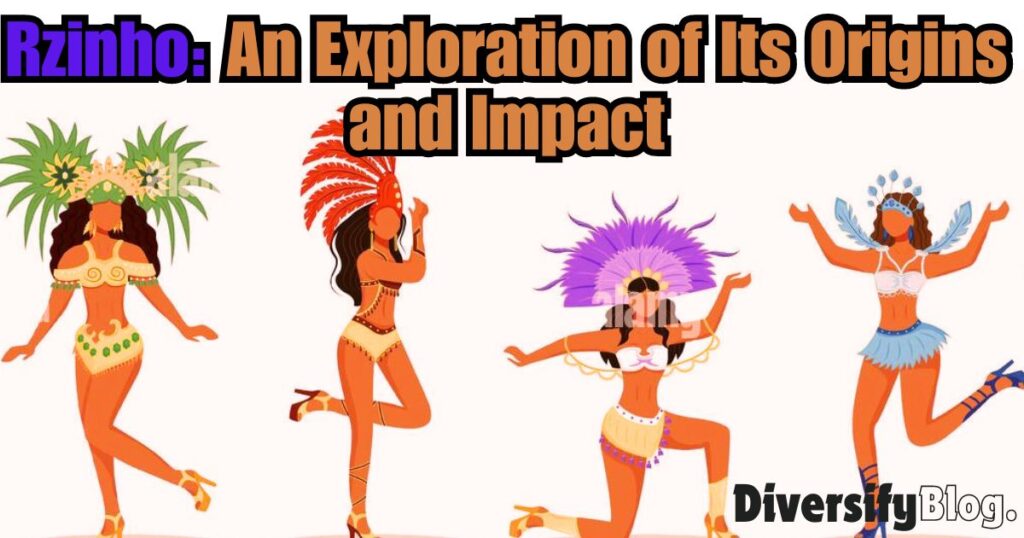Introduction to Rzinho
Rzinho is a term that resonates deeply within various cultural, linguistic, and social contexts. Though seemingly simple, its significance is profound, encapsulating a rich history and an evolving narrative that continues to influence contemporary society. This article explores Rzinho, tracing its origins, unpacking its cultural significance, and examining its modern-day impact. By understanding Rzinho, we gain valuable insights into the interplay between language, culture, and identity.
Table of Contents
What is Rzinho?
Rzinho is a term imbued with layers of meaning that vary depending on the context in which it is used. At its core, Rzinho often conveys a sense of endearment, familiarity, or affection, making it a key term in the social fabric of certain communities. It’s more than just a word; Rzinho embodies the essence of personal and collective identity, tradition, and cultural expression. Its versatility allows it to serve multiple functions in daily life, from casual conversation to artistic expressions, making it a symbol of cultural continuity.

The Origins of Rzinho
The origins of Rzinho can be traced to the vernacular of specific regions, where it first emerged as a colloquial term in local dialects. The etymology of Rzinho is rooted in the linguistic practices of these communities, reflecting the unique phonetic and syntactical features that characterize their speech. Over time, Rzinho transcended its local beginnings, evolving into a term with broader cultural and social resonance. Its journey from a regional expression to a term of wider significance illustrates the dynamic nature of language and its ability to adapt to changing cultural landscapes.
Linguistic Roots of Rzinho
The linguistic roots of Rzinho are deeply embedded in the phonology and morphology of the dialects from which it originated. The term’s structure often includes diminutive or affectionate suffixes, which are common in many languages to convey smallness, endearment, or familiarity. This linguistic feature reflects a broader cultural practice of using language to forge and reinforce social bonds. The evolution of Rzinho’s linguistic form also highlights how language serves as a living archive of cultural history, preserving the nuances of human interaction and social norms.
Rzinho in Brazilian Culture
Within Brazilian culture, Rzinho occupies a special place, particularly in informal communication. It is frequently used to express closeness, affection, or a playful familiarity between speakers. The term’s widespread usage in Brazil underscores the country’s rich and diverse linguistic heritage, where regional dialects and colloquialisms play a significant role in everyday communication. Rzinho’s cultural resonance in Brazil is not just a reflection of language but also of the country’s broader cultural practices, where informal, warm, and personal interactions are highly valued.
Cultural Significance of Rzinho
Rzinho’s cultural significance goes beyond its linguistic function; it serves as a symbol of identity, heritage, and community values. In many ways, Rzinho encapsulates the collective experiences and shared history of the communities that use it. It is a marker of cultural continuity, connecting past traditions with present practices. By using Rzinho, individuals signal their belonging to a particular cultural group, reinforcing a sense of community and shared identity. This cultural role makes Rzinho an integral part of the social fabric, as it helps to maintain and transmit cultural values across generations.
Rzinho in Music and Art
Rzinho’s influence extends into the realms of music and art, where it often appears as a motif or theme. In music, Rzinho might be referenced in lyrics or used as a symbolic element in compositions, reflecting its deep cultural resonance. Musicians and artists frequently draw on the emotional and cultural weight of Rzinho to create works that resonate with audiences on a personal and cultural level. The presence of Rzinho in art and music highlights its role in shaping and reflecting cultural narratives, making it a powerful tool for artistic expression.
Rzinho in Literature and Storytelling
In literature and storytelling, Rzinho often takes on symbolic roles, representing various cultural and emotional themes. Authors might use Rzinho as a character name, a metaphor, or a recurring motif, enriching their narratives with its layered meanings. The use of Rzinho in literature reflects its cultural and emotional significance, as it adds depth to stories and helps convey the complexity of cultural experiences. Through storytelling, Rzinho becomes a vehicle for exploring themes of identity, belonging, and cultural continuity, contributing to the richness of literary traditions.
Rzinho as a Nickname
Rzinho is also commonly used as a nickname, embodying personal identity and social connections. Nicknames often carry significant personal and cultural meaning, and Rzinho is no exception. It reflects how individuals relate to each other and the importance of names and nicknames in shaping social interactions. For many, being called Rzinho is a sign of affection or endearment, reinforcing the close bonds between friends, family, and community members. The use of Rzinho as a nickname underscores its role in personal identity and social cohesion, highlighting the importance of language in defining relationships.
Personal Identity of Rzinho
For those who adopt Rzinho as a nickname, it becomes a cherished aspect of their personal identity. It encapsulates not just a name, but a connection to cultural heritage and social networks. The personal identity tied to Rzinho is often a reflection of an individual’s place within their community, their relationships, and their cultural background. This makes Rzinho a powerful marker of self-perception and social identity, as it embodies the intersection of the personal and the cultural.
Public Figures and Celebrities
Public figures and celebrities who adopt the name Rzinho often do so as a way to enhance their personal brand or connect with their audience on a more intimate level. The use of Rzinho by celebrities can elevate its status, turning it into a symbol of success, charisma, or cultural pride. For fans, the use of Rzinho by a public figure can create a sense of connection or familiarity, further embedding the term in popular culture. This phenomenon illustrates how Rzinho can transcend its original context to become a broader cultural symbol.
The Global Influence of Rzinho
Rzinho’s influence is not confined to its place of origin; it has spread globally, reaching new audiences and adapting to different cultural environments. The global spread of Rzinho is a testament to its versatility and appeal, as it finds relevance in a variety of cultural contexts. Through media, migration, and cultural exchange, Rzinho has become a global phenomenon, illustrating the power of cultural expressions to cross borders and connect people.
Spread Through Media
The spread of Rzinho through media has played a significant role in its global recognition. Films, music, television, and digital platforms have all contributed to amplifying Rzinho’s visibility, showcasing how it can be adapted and integrated into contemporary culture. This media presence reflects Rzinho’s adaptability and enduring relevance, as it continues to resonate with audiences around the world. The portrayal of Rzinho in various forms of media also contributes to its evolving meaning, as different interpretations and uses are introduced to new audiences.
Cultural Exchange
Cultural exchange has been crucial in the dissemination of Rzinho across different regions and cultural groups. As people move and interact across borders, they bring with them their language, traditions, and cultural practices, including the use of Rzinho. This exchange allows Rzinho to integrate into new cultural contexts, highlighting its ability to bridge different cultural experiences. The spread of Rzinho through cultural exchange emphasizes the dynamic nature of cultural terms and their potential to enrich and diversify global culture.
Rzinho in Modern Contexts
In the modern world, Rzinho continues to evolve, influenced by social media, global communication trends, and the ever-changing cultural landscape. Its use in digital spaces, particularly on social media platforms, reflects contemporary communication practices and the term’s adaptation to modern formats. Rzinho’s presence in these contexts showcases its relevance in today’s digital age, where it continues to play a role in shaping cultural narratives and social interactions.
Social Media and Communication
Social media has significantly expanded the reach of Rzinho, allowing it to connect with a global audience. Platforms like Twitter, Instagram, and TikTok have amplified Rzinho’s presence, making it a part of digital conversations and online communities. This digital presence has transformed how Rzinho is perceived and utilized in everyday communication, enhancing its role in social interactions and cultural exchange. The use of Rzinho on social media reflects its adaptability to new forms of communication and its ability to resonate with a diverse audience.
Branding and Marketing
In branding and marketing, Rzinho has found new life as a tool for engaging with audiences and creating culturally resonant content. Companies and brands leverage Rzinho to craft messages that are relatable and culturally relevant, tapping into the emotional and cultural connections that the term evokes. The use of Rzinho in marketing strategies underscores its value in connecting with diverse audiences, highlighting its potential to enhance brand identity and foster customer loyalty.
The Emotional Impact of Rzinho
Rzinho is not just a term; it carries a significant emotional impact for those who use it. Whether in personal conversations or public discourse, Rzinho fosters connections and evokes feelings of familiarity, belonging, and cultural pride. The emotional significance of Rzinho is rooted in its ability to enhance personal and communal relationships, making it an important term in various social contexts.
Building Connections Through Rzinho
One of Rzinho’s most powerful aspects is its ability to build connections between people. Whether used in personal interactions or within larger communities, Rzinho helps to strengthen relationships and foster a sense of belonging. The term’s role in building connections reflects its importance in enhancing social interactions and creating a sense of community. Through Rzinho, individuals can express their cultural identity and connect with others who share similar backgrounds or experiences.
Cultural Identity and Rzinho
Rzinho plays a crucial role in expressing and preserving cultural identity. It serves as a link between individuals and their cultural heritage, allowing them to maintain a connection to their roots while navigating contemporary life. The use of Rzinho as a cultural identifier highlights its significance in maintaining cultural continuity and fostering a sense of pride and belonging. By embracing Rzinho, individuals and communities affirm their cultural identity and contribute to the preservation of their cultural heritage.
Question and Answers
What does “Rzinho” mean?
“Rzinho” typically represents a diminutive form or a term of endearment in the Portuguese language, often used to express affection, familiarity, or smallness. The “zinho” suffix is added to the end of a name or word to make it sound more endearing or less formal. It’s commonly used in Brazilian Portuguese and can apply to names, objects, or even situations to convey a sense of closeness or affection.
Is Rzinho only performed in Brazil?
If Rzinho refers to a specific cultural practice or dance (as your question suggests), it may have originated in Brazil, but it is not necessarily confined to the country. Cultural practices like dances can spread beyond their place of origin through globalization, cultural exchange, and migration. While Rzinho may be most closely associated with Brazilian culture, especially if it’s a traditional or regional dance, it can be performed in other parts of the world where there is interest or a community that values Brazilian culture.
Can anyone learn Rzinho, regardless of age or experience?
Yes, anyone can learn Rzinho, regardless of age or experience. Cultural practices and dances are generally accessible to people of all ages and skill levels. Like most traditional or folk dances, Rzinho would typically be taught within the community, with more experienced dancers guiding beginners. It’s also common for cultural dances to be inclusive, allowing people of various backgrounds to participate and learn at their own pace.
What attire is suitable for Rzinho dancing?
The suitable attire for Rzinho dancing would depend on the specific cultural or traditional context of the dance. Typically, traditional dances have specific costumes that reflect the cultural heritage of the region. These might include brightly colored garments, flowing skirts, or other culturally significant attire. For a more modern or casual setting, comfortable clothing that allows for free movement might be appropriate. If Rzinho is performed at a formal cultural event, dancers might wear traditional outfits to honor the cultural roots of the dance.
Are there any specific cultural events where Rzinho is prominently featured?
If Rzinho is indeed a cultural dance or practice, it would likely be prominently featured in Brazilian cultural events, festivals, and celebrations. Events such as Carnival in Brazil, regional festivals, or cultural celebrations might showcase traditional dances like Rzinho. These events serve as a way to preserve and celebrate cultural heritage, so Rzinho would be a key part of such festivities, especially in regions where it has deep cultural roots.
If Rzinho is a broader cultural practice or has different connotations, please provide additional context so I can tailor the answers more precisely.
Conclusion: The Enduring Legacy of Rzinho
Rzinho’s journey from a regional term to a global cultural symbol is a testament to its enduring relevance and impact. Its ability to adapt and resonate across different cultural contexts ensures that Rzinho will continue to play a significant role in shaping language, culture, and identity. As we look to the future, Rzinho’s legacy will likely expand further, continuing to enrich the cultural tapestry of communities around the world. Through Rzinho, we gain a deeper understanding of the power of language and its ability to connect us to our past, present, and future.




















4 Comments
Your comment is awaiting moderation.
I am extremely impressed with your writing abilities and also with the
structure to your weblog. Is this a paid topic or did you customize it your self?
Anyway stay up the nice high quality writing, it’s rare to see a great blog like this one today.
Beehiiv!
[…] you’re looking for music that stands out from the usual classical or traditional wedding songs, EDM is a great choice. EDM tracks offer more than just a party vibe; they bring […]
[…] Topsail Beach, located on Topsail Island, North Carolina, is known for its pristine beaches and welcoming community. Visitors are drawn to its beautiful sandy shores and serene atmosphere, making it a perfect getaway for families and couples alike. The area offers a peaceful environment that is far from the hustle and bustle of city life, making it an ideal spot for relaxation and recreation. […]
[…] is at the top of the list. This firework has become a favorite for many, from family gatherings to community celebrations. So, let’s take a closer look at what makes this firework such a delightful addition to any […]
[…] Rzinho: An Exploration Of Its Origins And Impact […]